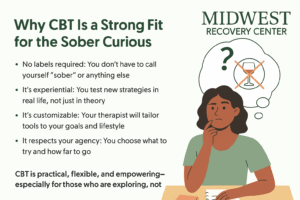Even if you’re not drinking to extremes, stepping back can feel like stepping away from your social life, your outlet, even your sense of self. That doesn’t mean it’s the wrong move—it just means it’s a big one. Using cognitive behavioral therapy (CBT), you can begin to reshape how you cope, connect, and celebrate without alcohol in the mix.
Midwest Recovery Center’s CBT program in Toledo, Ohio helps clients do just that—without labels, pressure, or assumptions.
Start by Noticing the Pattern
CBT starts with a deceptively simple skill: noticing. When do you usually reach for a drink—and what are you actually feeling in those moments?
Many people who are sober curious aren’t struggling with “addiction” in a clinical sense. But they are noticing that alcohol is doing more emotional heavy lifting than they’re comfortable with. Maybe it takes the edge off after work. Maybe it’s how you feel confident at a party. Maybe it’s how you bond with friends—or avoid loneliness.
CBT helps you slow down the autopilot. Instead of reacting to a trigger with a well-worn habit, you pause and explore what’s underneath.
You might start journaling patterns or working with a therapist to map common situations, thoughts, and emotions. Over time, you’ll learn to separate the situation (e.g., “I’m alone on a Friday night”) from the thought (“I’m boring if I’m not going out”), the emotion (loneliness), and the behavior (drinking). That’s the CBT map. And once you see the route clearly, you can begin to take a new path.
Redefine What Fun Looks Like to You
One of the biggest questions sober curious folks wrestle with is: Will I still have fun without alcohol?
That question is deeply personal—and CBT won’t answer it for you. But it will help you explore it with honesty and flexibility.
Through techniques like behavioral experiments, you can test out alternatives to your usual drinking rituals. These aren’t about giving things up. They’re about trying new inputs and observing the result—like a scientist.
For example, instead of going out drinking on a Saturday, maybe you try hosting a game night, taking a dance class, or even doing nothing and seeing how it feels. Afterward, you reflect. Did I enjoy myself? Was I bored? Did I feel awkward—and if so, why?
One CBT client shared:
“I always thought I drank because it was fun. Turns out, it was because I didn’t know how to be still. Learning that changed everything.”
When you remove alcohol from the “fun” equation, you create space to redefine it—on your own terms.
Build a Toolkit for Stress Relief That Actually Works
Alcohol is often used as a fast-acting stress reducer. The problem is, it doesn’t address what’s underneath—and it often adds new stress later (hello, Sunday scaries).
CBT teaches you how to break this cycle by offering skills that soothe and strengthen.
You’ll learn to:
- Identify distorted thinking (e.g., “If I mess up at work, I’ll get fired”)
- Replace it with more realistic thoughts (e.g., “Everyone makes mistakes. One bad day doesn’t define me”)
- Practice grounding tools to regulate your nervous system in the moment
- Reflect afterward to reinforce what worked
Unlike alcohol, these tools help you build resilience over time instead of numbing out.
And they’re yours to keep.
Reclaim Your Identity Without the Labels
A lot of sober curious folks get stuck on identity. If I don’t drink, am I sober? Am I allowed to still hang out with drinkers? Do I have to explain myself?
CBT doesn’t demand answers to these questions—it helps you live into them.
Therapists trained in CBT often use values clarification to help you explore the why beneath your curiosity. Are you seeking clarity? Energy? Deeper relationships? Less anxiety? A sharper sense of self?
Once you understand what you’re moving toward—not just what you’re taking away—things start to feel less black and white.
One client reflected:
“I realized alcohol wasn’t my identity. It was a tool I didn’t need anymore. I’m still me—I just show up more fully now.”
CBT gives you the scaffolding to rebuild identity from the inside out, without pressure to define it for anyone else.
Expect Resistance—and Keep Going Anyway
Let’s be real: trying new things without alcohol can be awkward. Even uncomfortable.
That discomfort isn’t a sign that you’re failing—it’s a sign that you’re doing something new. CBT frames resistance as part of the process, not a red flag.
You might:
- Crave the old routine
- Feel self-conscious around friends who are drinking
- Question your choice during a rough week
CBT teaches you to expect those moments and meet them with curiosity, not criticism. That shift—from “I can’t do this” to “What’s this moment telling me?”—is where change takes root.
And remember, discomfort isn’t danger. It’s data.
Why CBT Is a Strong Fit for the Sober Curious
CBT is practical, flexible, and empowering—especially for those who are exploring, not in crisis. It meets you where you are, and walks with you forward.
Here’s why it works so well:
- No labels required: You don’t have to call yourself “sober” or anything else
- It’s experiential: You test new strategies in real life, not just in theory
- It’s customizable: Your therapist will tailor tools to your goals and lifestyle
- It respects your agency: You choose what to try and how far to go
Whether you’re taking a month off drinking or rethinking your entire relationship with alcohol, CBT can help you navigate with clarity and confidence.
FAQ: CBT and the Sober Curious Journey
What is CBT, exactly?
CBT, or cognitive behavioral therapy, is a structured, evidence-based form of talk therapy that helps you understand how thoughts, feelings, and behaviors are connected. It teaches practical tools for managing emotions, changing unhelpful patterns, and making values-aligned choices.
Do I have to stop drinking completely to benefit from CBT?
Not at all. Many people use CBT to examine their habits without committing to full sobriety. Your therapist will support your goals, whether that’s cutting back, taking a break, or quitting entirely.
Will CBT feel like I’m in “treatment” even if I don’t identify as having a problem?
CBT isn’t about labeling or diagnosing—it’s about helping you think and feel differently in areas where you feel stuck. It’s more like mental fitness coaching than clinical intervention when used for sober curiosity.
Can I do CBT on my own, or do I need a therapist?
Some CBT tools are accessible through apps, books, or self-guided worksheets. But working with a trained therapist—like those at Midwest Recovery Center—offers deeper insight, accountability, and tailored support.
Is CBT available in person in Toledo, or just virtually?
Midwest Recovery Center offers CBT-based support as part of our outpatient and therapy services in Toledo, Ohio. Options may include in-person or virtual sessions depending on your needs.
Ready to Explore Sobriety Without Pressure?
Sober curiosity doesn’t mean you have to figure it all out today. It means you’re willing to ask new questions—and that’s a powerful beginning.
Cognitive Behavioral Therapy Program in Toledo, Ohio helps you find answers that fit you—not someone else’s program, label, or rules. It’s a way to get clear on what you want, how you feel, and who you’re becoming.
Whether you’re stepping back from alcohol for a week, a season, or the long haul, you don’t have to do it alone.
Let’s take the next step together.
Call (888) 657-0858 or visit our CBT services in Toledo, Ohio to learn more about how Midwest Recovery Center can support your sober curious journey—no pressure, just possibilities.









